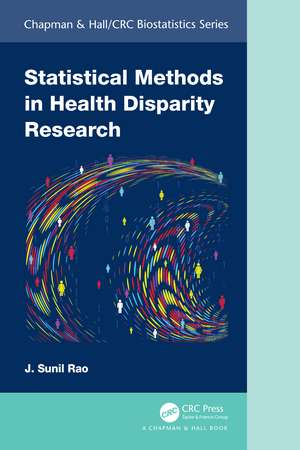Statistical Methods in Health Disparity Research: Chapman & Hall/CRC Biostatistics Series
Autor J. Sunil Raoen Limba Engleză Hardback – 11 iul 2023
Features:
- Presents an overview of methods and applications of health disparity estimation
- First book to synthesize research in this field in a unified statistical framework
- Covers classical approaches, and builds to more modern computational techniques
- Includes many worked examples and case studies using real data
- Discusses available software for estimation
Din seria Chapman & Hall/CRC Biostatistics Series
-
 Preț: 386.63 lei
Preț: 386.63 lei - 5%
 Preț: 338.18 lei
Preț: 338.18 lei - 5%
 Preț: 656.97 lei
Preț: 656.97 lei -
 Preț: 341.43 lei
Preț: 341.43 lei -
 Preț: 355.92 lei
Preț: 355.92 lei - 8%
 Preț: 432.16 lei
Preț: 432.16 lei -
 Preț: 354.78 lei
Preț: 354.78 lei -
 Preț: 342.90 lei
Preț: 342.90 lei -
 Preț: 288.81 lei
Preț: 288.81 lei -
 Preț: 312.36 lei
Preț: 312.36 lei - 9%
 Preț: 644.58 lei
Preț: 644.58 lei - 8%
 Preț: 376.64 lei
Preț: 376.64 lei -
 Preț: 372.30 lei
Preț: 372.30 lei -
 Preț: 356.64 lei
Preț: 356.64 lei - 8%
 Preț: 531.51 lei
Preț: 531.51 lei - 9%
 Preț: 608.33 lei
Preț: 608.33 lei - 9%
 Preț: 766.28 lei
Preț: 766.28 lei -
 Preț: 378.12 lei
Preț: 378.12 lei -
 Preț: 356.64 lei
Preț: 356.64 lei - 9%
 Preț: 682.94 lei
Preț: 682.94 lei - 9%
 Preț: 594.80 lei
Preț: 594.80 lei -
 Preț: 311.47 lei
Preț: 311.47 lei -
 Preț: 362.08 lei
Preț: 362.08 lei - 9%
 Preț: 833.75 lei
Preț: 833.75 lei - 9%
 Preț: 683.12 lei
Preț: 683.12 lei - 9%
 Preț: 681.83 lei
Preț: 681.83 lei -
 Preț: 370.53 lei
Preț: 370.53 lei - 9%
 Preț: 940.39 lei
Preț: 940.39 lei - 18%
 Preț: 791.14 lei
Preț: 791.14 lei - 18%
 Preț: 702.37 lei
Preț: 702.37 lei - 18%
 Preț: 1730.31 lei
Preț: 1730.31 lei - 28%
 Preț: 875.16 lei
Preț: 875.16 lei - 18%
 Preț: 786.89 lei
Preț: 786.89 lei - 25%
 Preț: 825.63 lei
Preț: 825.63 lei - 15%
 Preț: 678.14 lei
Preț: 678.14 lei - 25%
 Preț: 557.58 lei
Preț: 557.58 lei - 29%
 Preț: 625.83 lei
Preț: 625.83 lei - 18%
 Preț: 786.38 lei
Preț: 786.38 lei - 25%
 Preț: 778.07 lei
Preț: 778.07 lei - 25%
 Preț: 628.29 lei
Preț: 628.29 lei - 18%
 Preț: 1124.97 lei
Preț: 1124.97 lei - 28%
 Preț: 881.75 lei
Preț: 881.75 lei - 25%
 Preț: 526.81 lei
Preț: 526.81 lei - 18%
 Preț: 797.46 lei
Preț: 797.46 lei - 15%
 Preț: 479.86 lei
Preț: 479.86 lei - 18%
 Preț: 1017.63 lei
Preț: 1017.63 lei
Preț: 712.51 lei
Preț vechi: 750.00 lei
-5% Nou
Puncte Express: 1069
Preț estimativ în valută:
136.34€ • 148.56$ • 114.89£
136.34€ • 148.56$ • 114.89£
Carte tipărită la comandă
Livrare economică 24 aprilie-08 mai
Preluare comenzi: 021 569.72.76
Specificații
ISBN-13: 9780367635121
ISBN-10: 0367635127
Pagini: 298
Ilustrații: 130 Halftones, color; 130 Illustrations, color
Dimensiuni: 156 x 234 x 20 mm
Greutate: 0.59 kg
Ediția:1
Editura: CRC Press
Colecția Chapman and Hall/CRC
Seria Chapman & Hall/CRC Biostatistics Series
ISBN-10: 0367635127
Pagini: 298
Ilustrații: 130 Halftones, color; 130 Illustrations, color
Dimensiuni: 156 x 234 x 20 mm
Greutate: 0.59 kg
Ediția:1
Editura: CRC Press
Colecția Chapman and Hall/CRC
Seria Chapman & Hall/CRC Biostatistics Series
Public țintă
AcademicCuprins
1. Basic Concepts. 2. Overall Estimation of Health Disparities. 3. Domain-specific Estimates. 4. Causality, Moderation and Meditation. 5. Machine Learning Based Approaches to Disparity Estimation. 6. Health Disparity Estimation Under a Precision Medicine Paradigm. 7. Extended Topics.
Notă biografică
J. Sunil Rao, Ph.D. is Professor of Biostatistics in the School of Public Health at the University of Minnesota, Twin Cities and Founding Director Emeritus in the Division of Biostatistics at the Miller School of Medicine, University of Miami.
He has published widely about methods for complex data modeling including high dimensional model selection, mixed model prediction, small area estimation, and bump hunting machine learning, as well as statistical methods for applied cancer biostatistics.
He is a Fellow of the American Statistical Association and an elected member of the International Statistical Institute.
He has published widely about methods for complex data modeling including high dimensional model selection, mixed model prediction, small area estimation, and bump hunting machine learning, as well as statistical methods for applied cancer biostatistics.
He is a Fellow of the American Statistical Association and an elected member of the International Statistical Institute.
Recenzii
“Rao’s book provides useful technical guidance, along with important substantive context that will be helpful to statisticians who seek to work effectively with multidisciplinary teams or who are pursuing health disparities statistical methods research…Overall, I enjoyed reading this book and expect to use it as a reference moving forward. I was pleased by Rao’s inclusion of a variety of methods given the multiple data types encountered in disparity research, including surveys. This enhances the book’s unique contribution. Rao took on a broad and ambitious topic with this book, so there will inevitably be topics missing from here in the view of some readers. Course instructors and other readers should be prepared to augment the information provided with supplementary materials. An instructor with expertise in statistical research aimed toward identifying health disparities should have no problem doing so.”
- Susan M. Paddock, Journal of the American Statistical Association, May 2024
- Susan M. Paddock, Journal of the American Statistical Association, May 2024
Descriere
A health disparity refers to a higher burden of illness, injury, disability, or mortality experienced by one group relative to others attributable to multiple factors including socioeconomic status, environmental factors, insufficient access to health care, individual risk factors and behaviors and inequalities in education.
